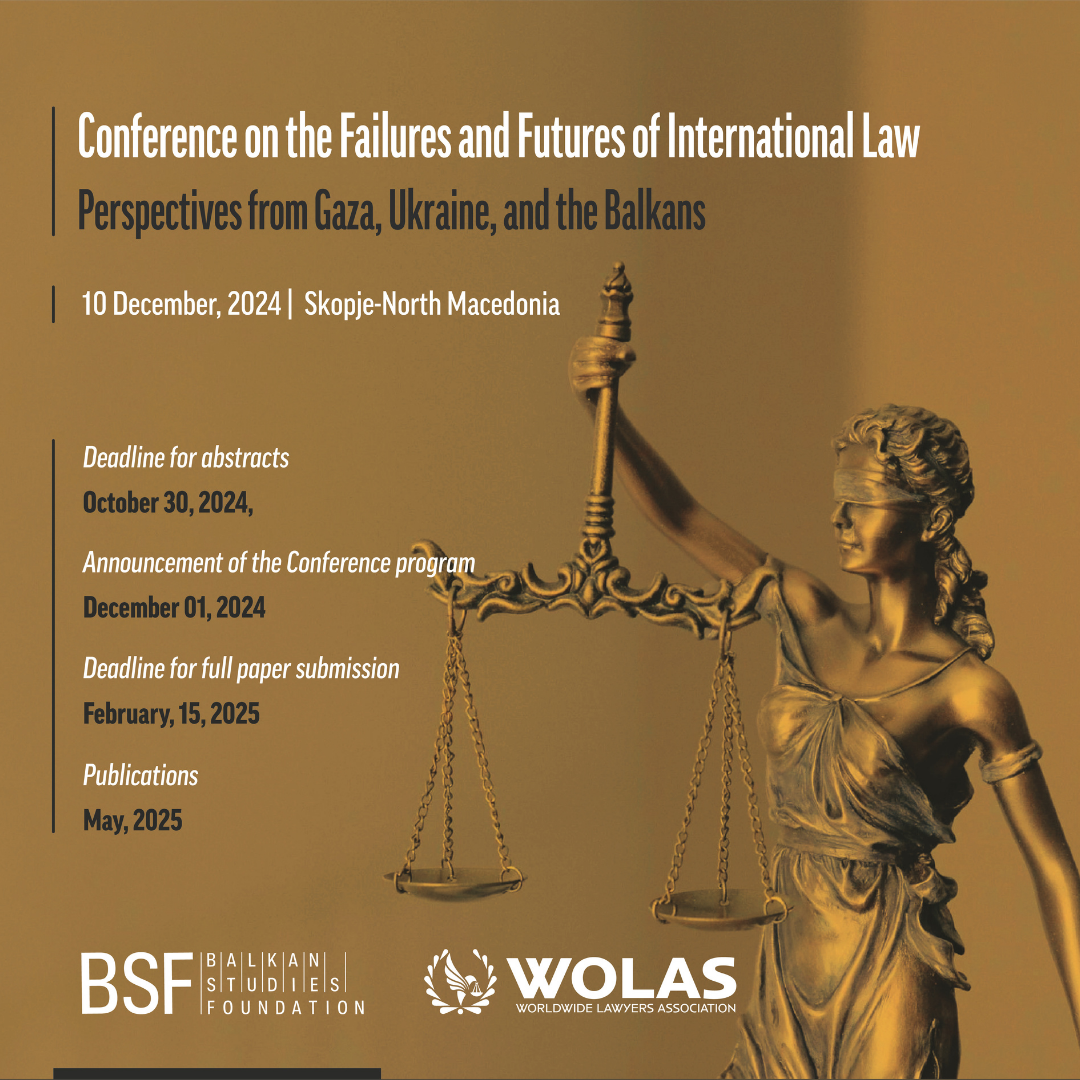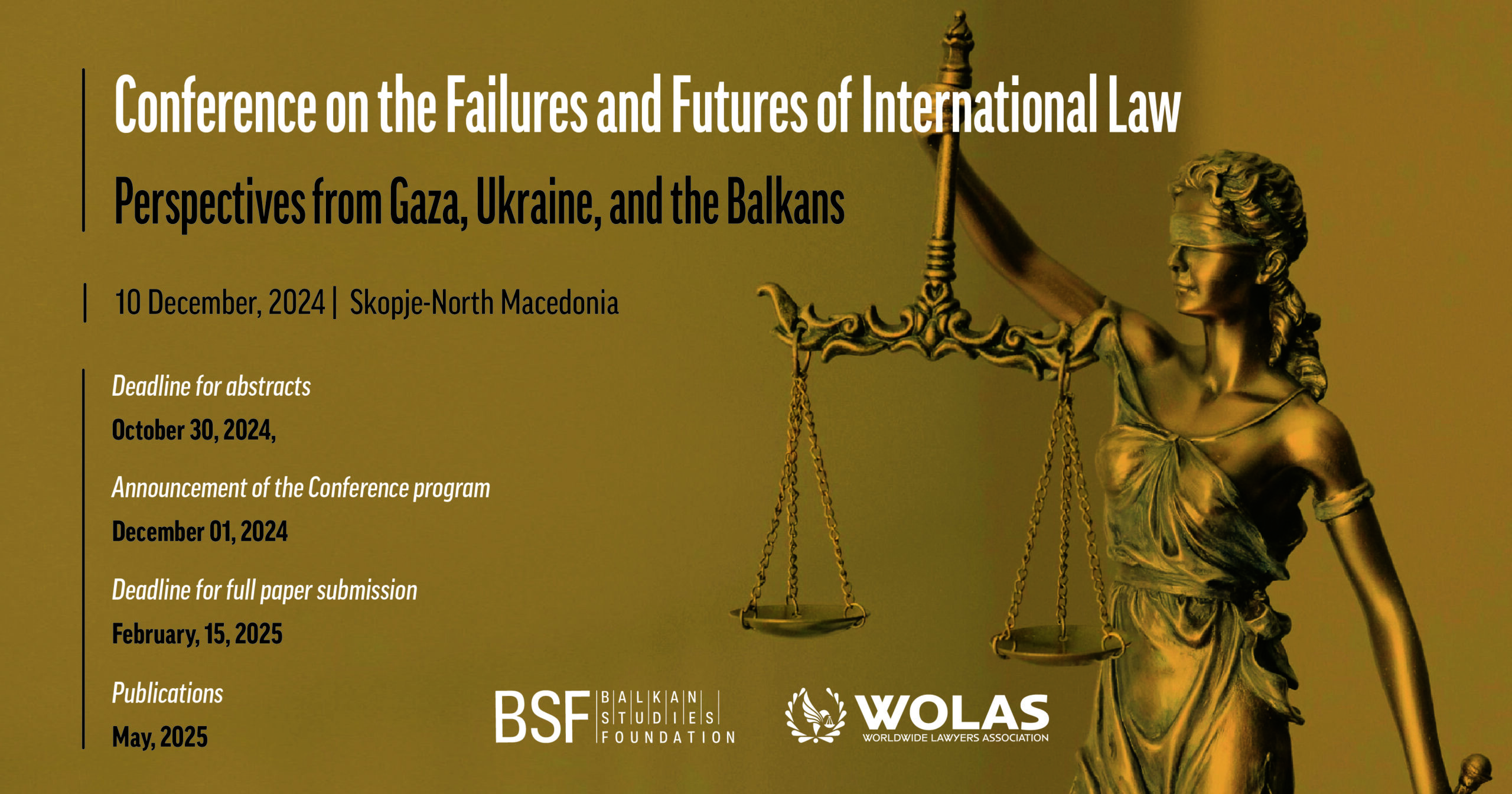
The Failures and Futures of International Law: Perspectives
from Gaza, Ukraine, and the Balkans
10 December, 2024, Skopje-North Macedonia
Call for Papers
Recent conflicts in Gaza and Ukraine have highlighted profound challenges to the foundations of international law and the effectiveness of global institutions. These conflicts underscore a trend of growing disregard for international norms, prompting a critical reevaluation of the so-called promises of international law-such as the protection and emancipation of the oppressed, the delivery of justice, the protection of human rights and the maintenance of international peace and security. The very rationale for the existence of global institutions-ensuring peace and stability-appears increasingly fragile, as these bodies, the United Nations in particular, struggle to respond effectively to escalating crises. The specter of a third world war is now being discussed with greater seriousness than ever before, reflecting a deepening crisis of confidence in the ability of the international legal order to uphold its most fundamental objectives.
At the same time, there has been a notable surge in the use of international law, institutions, and courts by various actors, reflecting a complex dynamic. Both the Global North, as seen in the case of Ukraine, and the Global South, as demonstrated by the situation in Palestine, have increasingly turned to legal avenues such as the International Court of Justice and the International Criminal Court. This signals not only a reliance on international law as a tool for addressing grievances but also raises questions about the uneven application and accessibility of justice across different geopolitical contexts. Further, the double standards exhibited by hegemonic powers in their responses to the Ukrainian and Palestinian situations have starkly exposed the enduring colonial legacies embedded within international law.
This conference seeks to explore the value of international law in these turbulent times, marked by both disregard and hope, and to critically assess what has been achieved thus far in the legal struggles of Ukrainians against Russian aggression and Palestinians against Israeli occupation and aggression. By examining these cases, the conference aims to foster a deeper understanding of the successes, challenges, and potential pathways for international law to more effectively address injustices across different geopolitical contexts.
Holding this conference in the Balkan region is particularly significant given the area’s historical experiences with wars, conflicts, and genocide. While it is crucial to evaluate whether lessons have been learned from these bitter experiences, it is equally important to adopt a forward-looking perspective. This conference aims to analyze the implications of current conflicts, such as those in Ukraine and Palestine, for the peaceful future of the Balkans and the potential role that international law may play in shaping this future.
Conference Themes
International Law Theory: Analyzing how historical and ongoing colonial influences and power relations shape international legal frameworks, often perpetuating injustices rather than resolving them. Papers should examine the systemic failures of international law, especially in contexts involving the Global South. Building on decolonising global hegemonic narratives, submissions are encouraged to propose frameworks for greater epistemological inclusivity of all cultures, fairer structures, and more equitable distribution of rights and obligations.
Palestine and International Law: Investigating the effectiveness—or lack thereof—of international legal mechanisms in addressing the rights and struggles of the Palestinian people and Israeli atrocities against them. This theme encourages exploration of how international law has been applied, ignored, or manipulated in this context. Ukraine and International Law: Assessing the international legal response to the conflict in Ukraine, including the issues of sovereignty, territorial integrity, human rights violations, war crimes and crimes against humanity. This theme also seeks to compare and contrast the treatment of Ukraine with other conflicts, particularly Palestine, to highlight inconsistencies and biases.
International Law and Balkans: Drawing lessons from the Ukrainian and Palestinian conflicts that resonate with the Balkan region’s historical and current geopolitical context. This theme invites reflections on how the Balkan states and people can address the complex landscape of international law and leverage these lessons for regional peace and security.
Submission Guidelines
We invite submissions of abstracts that address any of the above themes. Abstracts should be no more than 300 words and must be submitted by October 30, 2024. Please include a title, author name, affiliation, and contact information. Notifications of acceptance will be sent by November 15, 2024.
Costs
There is no registration fee for participating in the conference. We are pleased to offer funding for travel and accommodation expenses for a select number of papers, subject to review and approval.
Conference Organizer: Balkan Studies Foundation
Conference Schedule
October 30, 2024, Deadline for abstracts
December 01, 2024, Announcement of the Conference program
December, 11-12, 2024 Conference Date
February, 15, 2025 Deadline for full paper submission
May, 2025, Publication of the selected papers or publication research articles in Journal of Balkan Studies
Application form: https://forms.gle/wXAjYCVC34pvohKe7
Organizing Committee
Dr. Sevba Abdula, Balkan Studies Foundation, (North Macedonia)
Dr. Hasan Basri Bülbül, Boğaziçi University, (Türkiye)
Assist. Prof. Dr. Bujamin Bela, Mother Teresa Univeristy (North Macedonia)
Metin Xhelil, International Balkan University (North Macedonia)
Prof. Dr. Admir Mulaosmanovic, Balikesir University (Bosnia-Hercegovina)
Hanife Etem, Balkan Studies Foundation, (North Macedonia)
Elif N. Rushiti, Balkan Studies Foundation, (North Macedonia)
Scientific Committee
Prof. Dr. Ali Emrah Bozbayındır (Türkiye)
Prof. Dr. Mutaz M. Qafisheh (Palestine)
Prof. Dr. Berdal Aral (Türkiye)
Prof. Dr. Satvinder Juss (United Kingdom)
Prof. Dr. Ahmet Hamdi Topal (Türkiye)
Dr. Luigi Daniele (Italy)
Dr. Andrea Maria Pelliconi (United Kingdom)
Prof. Dr. Saul Takahashi (Japan)
